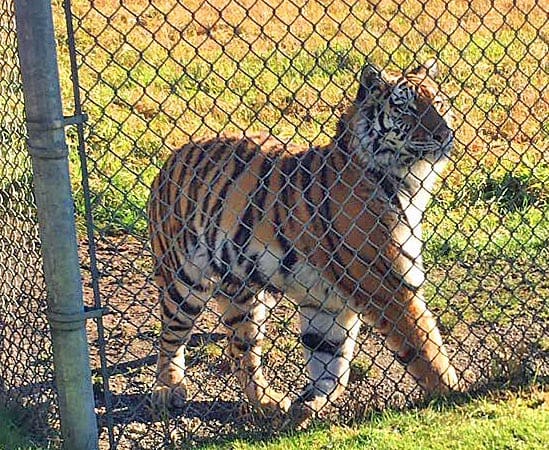Vancouver – A report commissioned by the Vancouver Humane Society (VHS) is calling on the Greater Vancouver Zoo (GVZ) to improve conditions for its animals and to move away from keeping animals unsuited to B.C.’s climate.
The report, commissioned from Zoocheck, found that many animals at the zoo are living in barren, under-sized cages and enclosures that restrict them from engaging in natural behaviours. The report also says the zoo does not provide adequate behavioural enrichment for the animals. (Behavioural enrichment involves providing animals with a stimulating environment that allows natural activities such as climbing, foraging or digging and also creates physical and cognitive tasks that simulate challenges animals would find in their natural environment.) The report notes these issues were identified in previous reports but little has changed.
“Captivity is never good for animals but the Greater Vancouver Zoo could at least provide animals with enclosures that allow them enough space and stimulation to avoid enduring lives of unrelenting boredom and frustration,” said VHS spokesperson Peter Fricker. “These problems need to be addressed urgently. In the longer term, the zoo needs to stop keeping captive animals for entertainment and move toward being a sanctuary for native wildlife.”
The report is also critical of the zoo’s giraffe enclosure, describing it as unchanged since a 2003 report described it as “barren and lacking in any stimulation for the animals to engage in natural behaviours.” The report states that giraffes are not suited to B.C.s climate and suggests the zoo consider constructing a new, larger and climate-controlled enclosure or relocating the giraffes to a more species-appropriate facility elsewhere.
The report cites the zoo’s raptor exhibit (holding kestrels, owls, hawks, etc.) as an example of an under-sized enclosure that denies natural behaviours, stating: “There was little or no ability for the birds to engage in flight.”
“It seems bizarre to have to tell the zoo that birds need to fly,” said Fricker, “but sadly that’s what they need to hear.”
The report also found that:
Reptiles in the zoo’s vivarium are being kept in “very restricted circumstances” with “minimal” space in some of the exhibits. Most of the reptiles were “inactive” and some demonstrated repetitive behaviours, indicating lack of stimulation.
The hippopotamus enclosure is “barren, lacking any vegetation and or enrichment elements” and the indoor holding facility is “small and not suitable for the permanent keeping of these animals…”
The zoo’s lone red fox should be found a companion or be rehomed to a facility that can meet its social requirements.
Squirrel monkeys and coatimundi are in small enclosure and should be moved to more appropriate accommodation.
The zoo suffers from excessive groundwater (water-logging), which has led to muddy enclosures and standing water in some areas.
The report recommends:
That the zoo develop a comprehensive environmental/behavioural enrichment program for all its animals.
That the zoo stop keeping animals that aren’t suited to B.C.’s climate and those it cannot accommodate in a way that “satisfies their physical, psychological and social needs…”.
That inadequate, undersized cages and enclosures be enlarged or removed.
The full report can be seen here.
-ends-

